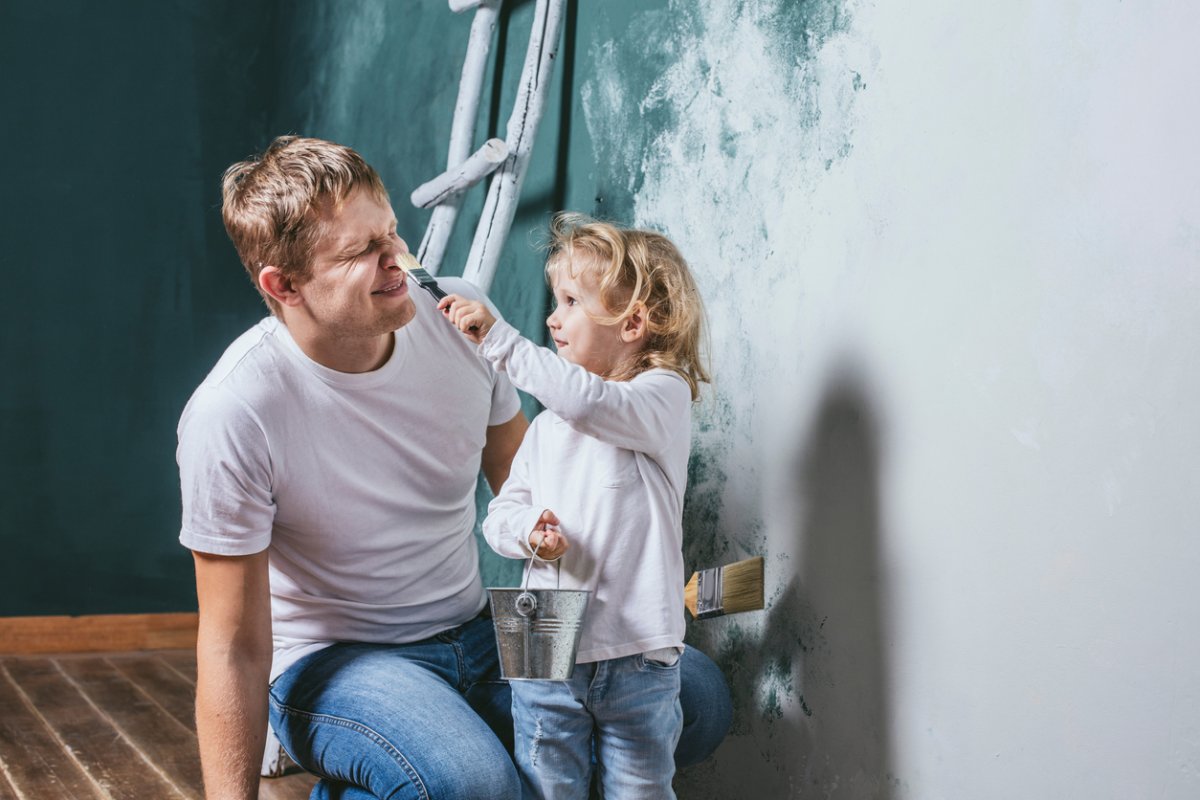
We may earn revenue from the products available on this page and participate in affiliate programs. Learn More ›
Historically, the most durable, long-lasting interior and exterior paints required harsh chemicals for superior binding to resist damage such as peeling and flaking over time. But the volatile organic compounds (VOCs) present in many paints are known for their acute and chronic effects on human health, not to mention their harsh effects on the environment.
As the health effects of traditional paints have come to light, homeowners have called for safer, more eco-friendly paint options to use on their homes that don’t compromise on quality. Many trusted paint manufacturers have recognized this shift in priorities and have introduced new options in the past two decades. Eco-friendly paint has come a long way since its inception in the ‘90s. Today, you can find high-quality interior and exterior paint that’s made with natural ingredients and dramatically reduced VOC content.
This guide to eco-friendly paints will help you navigate the most natural options on the market so you can find a paint you love and feel good about using in and on your home!
First, What Exactly Qualifies as an Eco-Friendly Paint?
Most eco-friendly paints have fewer chemicals and, therefore, lower VOC contents. Besides checking for the VOC content on the label, you can most noticeably distinguish a low-VOC paint by its odor: They have little to no noxious off-gassing smell because they lack these chemicals.
There are several independent testing labels that eco-friendly paints may have to certify their ingredients and VOC content. Two independent labels that exist in the United States include:
- Green Seal®: Certification with Green Seal requires VOC requirements not exceed 50 grams per liter for flat paint and 100 grams per liter for non-flat paints. This certification also means a product has met sustainability standards for reducing toxic pollution and protecting human health in addition to its low-VOC content. Consumers can find which products are Green Seal certified through Green Seal’s website.
- GREENGUARD: Paints that receive the GREENGUARD label must have less than 50 grams of VOCs per liter to be certified. GREENGUARD has different levels of certification, including GREENGUARD Gold, which has strict requirements and considers sensitive populations such as children and the elderly. Consumers can find the GREENGUARD label on paint manufacturer’s websites or by checking this list of GREENGUARD-approved paints.
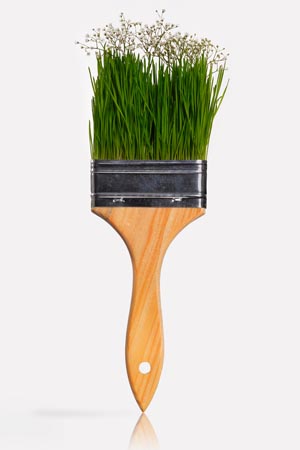
To put these amounts in perspective, the Environmental Protection Agency (EPA) currently allows paints VOC levels of up to 100 grams per liter for flat finishes and 250 grams per liter for glossy finishes. There are currently no federal standards in place for the terms “low-VOC” or “zero-VOC,” so you’ll need to check the label to determine the VOC content for yourself.
However, not all low-VOC paints are eco-friendly. Not only might they still contain some modicum of toxic chemicals, but they may also contain animal ingredients, even engage in controversial testing methods such as animal experiments to ensure product safety. While eco-friendly paint doesn’t have to be strictly vegan, animal products shouldn’t be the prime ingredients for truly eco-friendly paint. Conventional paints can contain animal products such as casein, which is a protein found in cow’s milk, as a binder. Paint made with milk is unsustainable and can have harsh effects on the environment, as cows produce greenhouse gases that affect climate change, the World Wildlife Fund reports.
True eco-friendly paint should have a more natural base, such as from water or plants instead of synthetic or animal-derived ingredients, and should be independently tested for safety and integrity, as universal standards for eco-friendly paint don’t exist yet.
The Importance of Choosing Eco-Friendly Paint
According to the EPA, indoor VOC levels are up to 10 times higher than those outdoors (yikes!), so this makes choosing an interior low-VOC paint important for your home’s indoor air quality.
Indoors especially but outdoors as well, eco-friendly paint can help improve air quality for people looking to reduce their exposure to harmful chemicals. The EPA also states that VOCs can cause minor problems such as headaches and nausea, but they can also cause major health issues such as allergic reactions, damage to major organs such as the liver and kidneys, nosebleeds, vomiting, and even memory impairment.
Reducing the use of harsh chemicals isn’t just beneficial for human health—it can help support a healthier planet by reducing toxins in the environment. VOCs in exterior paint can react with nitrogen oxides to pollute the ozone layer and affect the air we breathe, the American Lung Association explains.
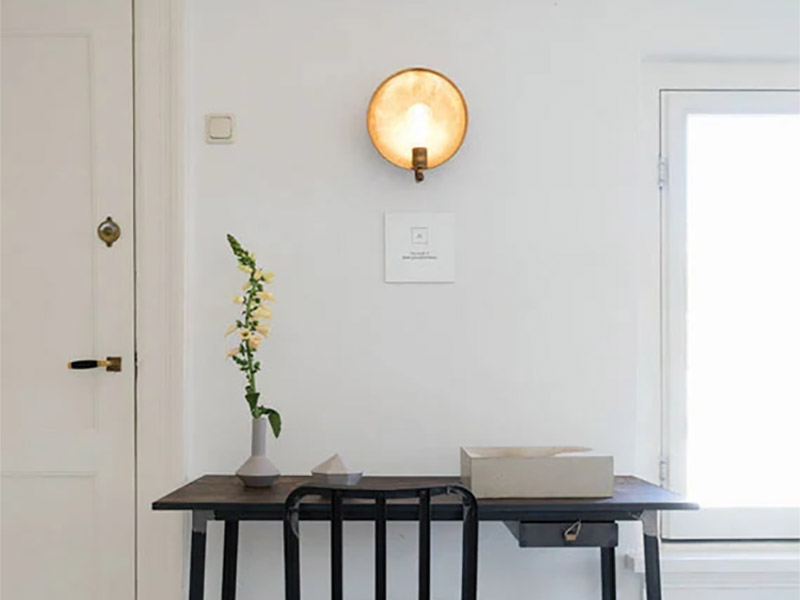
10 Eco-Friendly Paint Options to Consider for Your Next Project
The following products are the top eco-friendly paint options on the market today.
1. Farrow & Ball
Paint pick: Estate Emulsion Interior Wall & Ceiling Paint ($110/4L)
Farrow & Ball features no-VOC options with 100 percent water-based selections for their family-friendly interior paint, which has been independently tested and is GREENGUARD approved to ensure safety. The company is cruelty-free and committed to reducing its environmental impact through recycling. Available at Farrow & Ball and authorized retailers.
2. ECOS Paints
Paint pick: Exterior Satin Wall Paint ($75.95/gal)
This exterior paint suits stone, cinder block, brick, concrete, and siding yet contains zero VOCs and is completely non-toxic. Water-based and never tested on animals, ECOS Paints’ full collection offers a wide color selection in exterior, interior, and chalkboard paint. Available at ECOS Paints and Amazon.
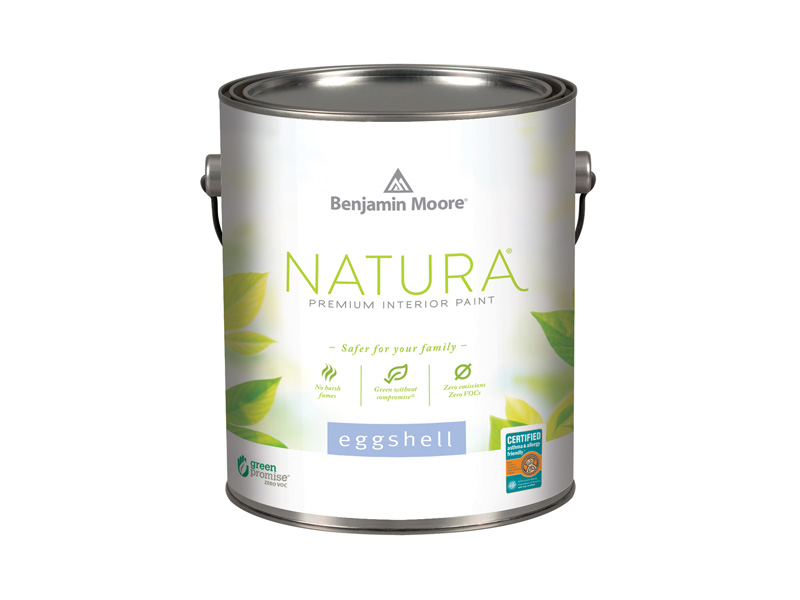
3. Natura Paint from Benjamin Moore
Paint pick: Natura Interior Paint ($67.99/gal)
Available in thousands of colors, Benjamin Moore’s Natura interior paint is independently tested to ensure no VOCs. The line earns its certification from Green Seal as well as asthma and allergy friendly® certification by the Asthma and Allergy Foundation of America and Allergy Standards Ltd. This acrylic-based paint is self-priming on most surfaces and engineered with Gennex® Color Technology to ensure your shade stays gorgeous for years. Available at Benjamin Moore and authorized retailers.
4. Green Planet Paints
Paint pick: Premium Interior Flat Paint ($50.99/gal)
This no-VOC, GREENGUARD verified, plant-based, non-toxic paint brand is advertised as being “so safe and natural you can bathe in it.” While that might be a tad extreme, their vegan interior paints allegedly improve indoor air quality by up to 50 percent and are ideal for most chemically sensitive people. Available at Green Planet Paints.
5. The BioShield Paint Company
Paint pick: Solvent-Free Wall Paint ($44-48/gal)
These no-VOC and GREENGUARD approved interior paints offer great coverage with just nine ingredients. While not intended for areas that are exposed to high levels of moisture (think bathrooms), BioShield paints are a natural alternative to conventional paints. Available at The BioShield Paint Company.
6. AURO
Paint pick: AURO Plantodecor Premium ($137.50/10L)
Also known as No. 524, this vegan and eco-friendly interior paint from AURO contains plant-derived ingredients that have been rigorously tested by European standards for safety. Excellent for all indoor surfaces, this paint adheres to strict low-VOC standards. Available at AURO USA.
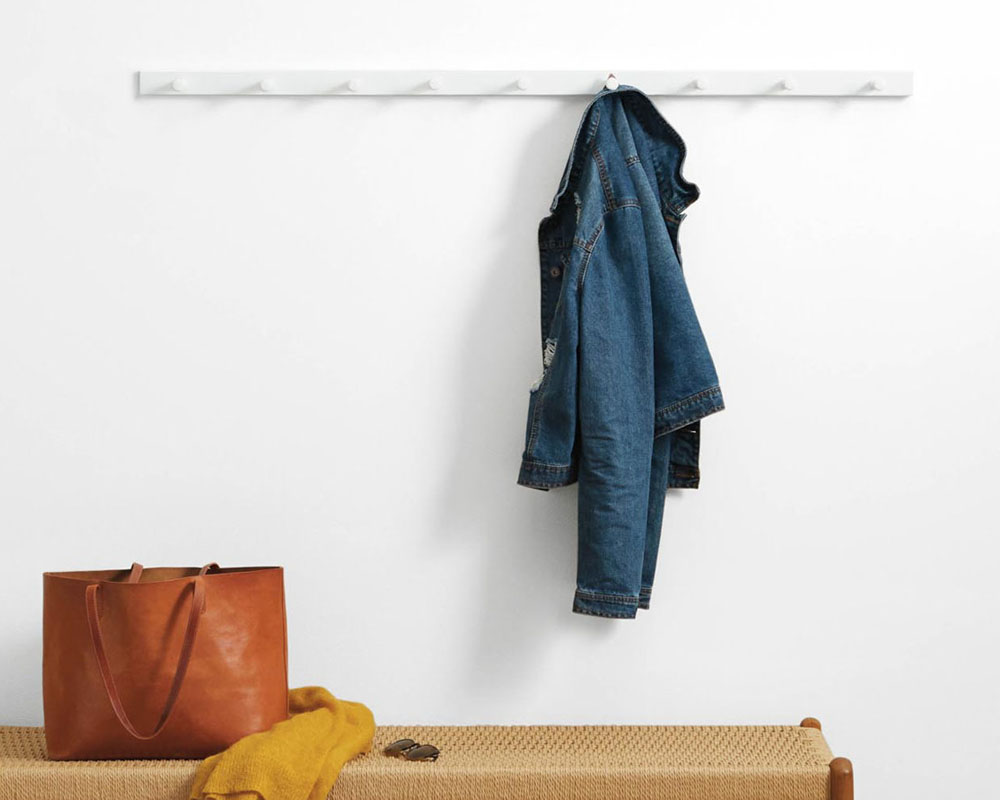
7. Clare Paints
Paint pick: Interior Wall Paint ($54/gal)
GREENGUARD Gold Certified, zero VOC, low-odor, and self-priming, Clare Paints contain no hazardous air pollutants nor toxic air contaminants. Their paint is also compliant with the Leadership in Energy and Environmental Design (LEED) regulations for green building products. Available at Clare Paints and select authorized retailers.
8. Unearthed Paints
Paint pick: Marmopure Paint ($39/gal)
With mostly vegan products and no animal testing, these paints are from a family-owned and operated company in Colorado. The manufacturer only uses natural earth and mineral pigments—no synthetic colors here! The paint is made from casein derived completely from plants rather than from milk for a completely biodegradable, zero-VOC coating. Available at Unearthed Paints.
9. Fine Paints of Europe
Paint pick: EUROLUX Exterior Paint ($125/2.5L)
Imported from Holland and in compliance with LEED requirements for indoor air contaminants, Fine Paints of Europe features cruelty-free, low-VOC exterior paint options for your home. Low-maintenance and featuring a huge range of colors, Fine Paints of Europe could be your next exterior top coat. Available at Fine Paints of Europe and select retailers.
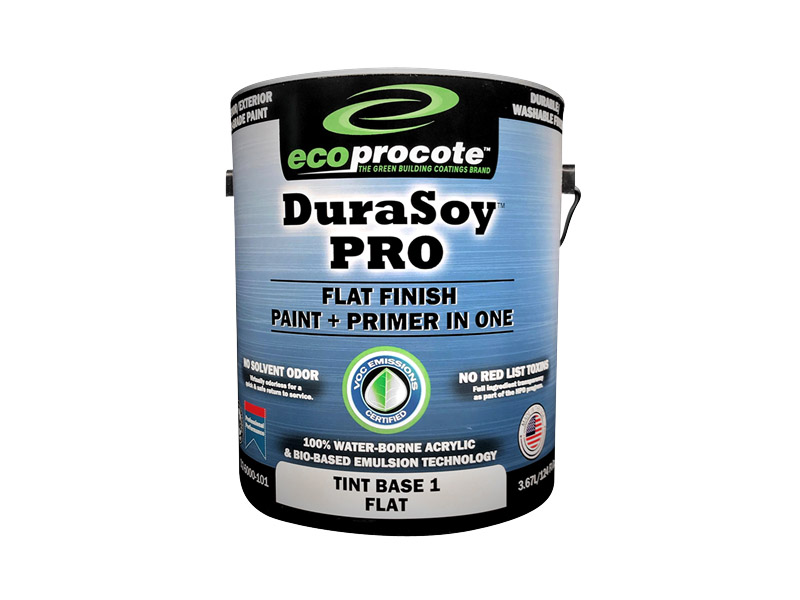
10. EcoProcote
Paint pick: DuraSOY PRO Paint + Primer Exterior Wall Paint ($54.98/gal)
Containing zero VOCs and made with renewable, plant-based ingredients, this professional-grade, toxin-free exterior and interior paint from EcoProCote is a great alternative to conventional exterior paints that contain high levels of VOCs. This paint-and-primer combo contains high solids for extra coverage, making it an excellent pick for your next exterior painting job! Available at EcoProCote and on request at authorized dealers.
